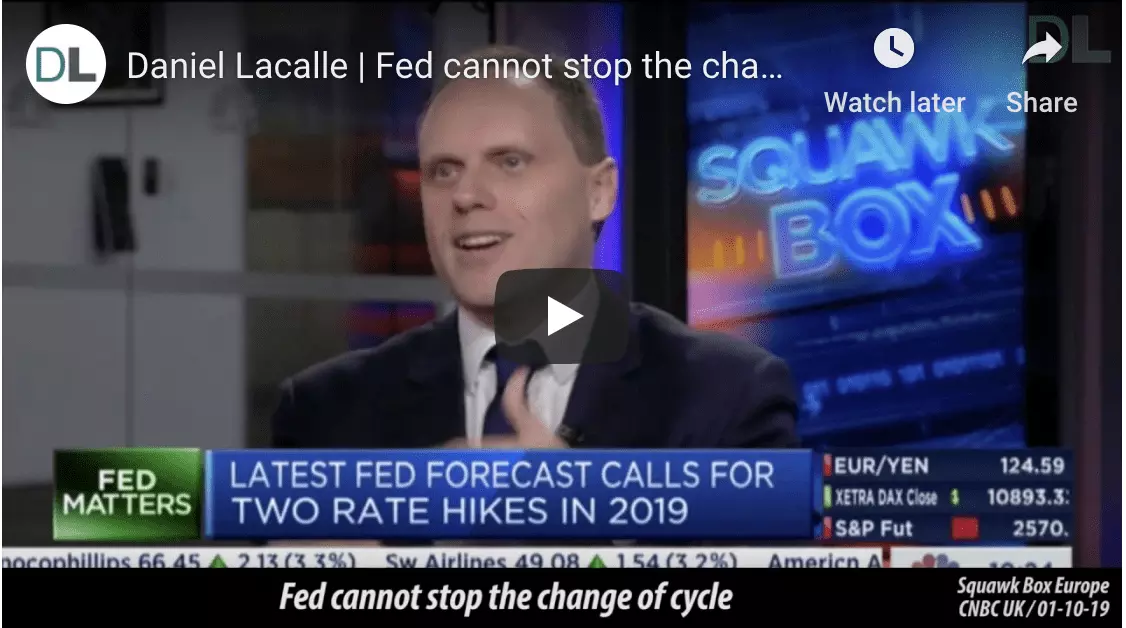The central idea is that we are in the process of a change of cycle that central banks and governments are unlikely to disguise because both monetary tools and fiscal space have been exhausted. This change of cycle may not lead to a 2008-style recession, but more likely to a Japanese-style stagnation as debt continues to rise while economic and productivity growth weaken.

As such, we as investors may believe the mirage of a chain of “bullish” headlines in the first part of 2019: a trade deal between the U.S. and China (likely), a large China stimulus (very likely) and central banks’ relative dovishness (highly likely). This may create short-term bounces, but the euphoria effect many quickly fade because even with a bounce in global liquidity, net financing needs may exceed real growth. If markets react quickly and aggressively to these “false” bullish signals increasing risk and leverage, the probability of falling into a 2008-style crisis increases. Liquidity is falling, and this may reduce this risk of abnormal bullishness.
- Eurozone slowdown worsens. After a moderate slowdown in 2018, the Eurozone economy is likely to enter a period of stagnation as France, Italy, Germany and Spain post weaker growth figures than expected. The likely rise in bond yields may also affect credit growth. Governments have completely abandoned any reform agenda and the rise in public spending combined with lower tax revenues and growth might erode the confidence in the solvency of the Eurozone major economies. Brexit is likely to be a minor factor in this slowdown. The largest impact is probably going to come from weakening consumption and industrial output. Weak commodity prices may help the Eurozone avoid a recession, but credit risks will probably intensify as the effect of ECB purchases ends and political unrest rises.
- Brexit impact becomes negligible on the UK economy. The process of exit from the EU is unlikely to create the doomsday scenario announced by many as the dynamism of the exporting industry, the strength of the labour market and the comparatively attractive taxation versus global peers generate a better growth environment for the UK.
- Commodities rebound only to fall again on China failed stimulus. There will likely be a trade agreement between China and the U.S. that may help energy commodities as well as base and industrial metals short-term. However, markets focusing on this trade agreement catalyst are likely to be disappointed into the end of the year as the evidence of debt saturation and structural factors behind the economic slowdown of China become more evident. The headlines of a massive stimulus and a trade agreement will probably drive growth estimates to overoptimistic levels that may need significant downgrades as the reality of disinflation and global slowdown becomes more apparent.
- Gold rises as liquidity dries up and currencies weaken. Emerging market concerns are likely to rise again as the recent calm is tested by large U.S. dollar denominated maturities. Emerging economies have increased their imbalances—both fiscal and trade deficits in many countries—throughout 2018. There is very little that most governments want to do to avoid the increasingly demanding net financing needs. As the optimism about growth and Federal Reserve dovishness fades, we are likely to see the central banks of most emerging economies letting their currencies devalue in order to maintain foreign exchange reserves.
- U.S. economy avoids recession but slows down. The government shutdown will not generate a massive impact on the economy, and steady flow of capital into the U.S. economy is likely to drive a moderate slowdown that avoids recession thanks to a stronger and more dynamic economy than the European, Japanese and Chinese. Low oil prices and a strong dollar are needed to avoid recession. If the Fed capitulates and halts the announced rate hikes, we might see a temporary bounce in risky assets and investors retrying the reflation trade, but only to see another year of two halves where flight to U.S. assets is likely to accelerate once investors find that the headlines of trade agreement, Fed dovishness and Chinese stimulus are not as bullish in terms of growth and global demand as needed to keep the U.S. dollar carry trade ongoing.
- The biggest positive scenario for 2019 would be that central banks maintain their promises of normalization and the economies gradually strengthen driven by savings and productive investment.
- The biggest negative scenario for 2019 is that economies believe that 2018 was an anomaly and fall into the trap of believing, like in 2008, that a China stimulus will prevent the change of cycle.




Leave your comments
Post comment as a guest